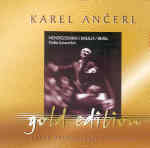This installment of Supraphon’s Gold Edition tribute to Karel Ancerl pertains more to the talents of violinist Joseph Suk, with the possible subsidiary elucidation of the conductor’s gifts as an accompanist. With the exception of the prize-winning traversal of the Berg Violin Concerto, Ancerl does not have much to do here, as the Mendelssohn and Bruch more or less play themselves. Supraphon’s extensive remastering unveils a more palpable sense of vibrancy and immediacy to the sound than in earlier releases of these performances. However, these 1960s recordings still suffer from a stridency in the upper strings, which is particularly unpleasant in the Bruch.
In the main, this celebration of Suk is a curiously uneven affair. It’s unusual to hear a performance of the Mendelssohn concerto as retiring, miniaturized, and so lacking in exuberance. This is all the more surprising when you consider Ancerl’s uncanny abilities in firing up performances of even the most overplayed war horses (check out the recent remasterings of Ma Vlast or Dvorák’s Symphony No. 9). By contrast, the Bruch (sonics aside) lacks restraint and errs on the side of being perhaps too expressive: dynamics remain fairly loud throughout and the intensity never lets up for a second. In some cases, the usually refined Czech players rip through the orchestral tuttis with an uncharacteristic coarseness (such as the entry just before rehearsal letter D).
The Berg account, still one of the finest interpretations in the discography, finds a winning middle ground between conductor (considered in any event a 20th-century music specialist) and soloist. While still beset by deficient recording techniques, most of Berg’s complex themes come through clearly and precisely, even if resonances in the various alto saxophone solos cause some weird balance problems. Suk takes a lyrical approach, digging in when he must but rarely overstating the musical argument. Likewise, Ancerl follows his soloist thoughtfully without once drowning him out. At the Allegretto section in the first movement, Ancerl coaxes a jauntiness from the winds that reflects a true 6/8 scherzando. The brass and percussion play with pinpoint accuracy in their jagged rhythmic outbursts in the second movement, and elsewhere subtle touches abound–for instance, the emphasis on the deep F-natural pedal tone in the low strings just before the big climax of the second movement. Although it’s the strong Berg performance that will impress most listeners, anyone interested in this Ancerl series will want this disc nonetheless.
































